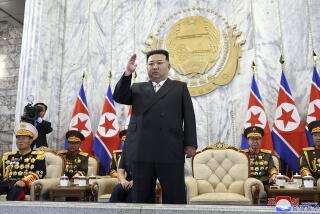Kabul Wary of Rebel Attack as It Marks Anniversary : Afghan Regime Makes Show of Strength--a Day Early
- Share via
KABUL, Afghanistan — Sophisticated Soviet-made fighter jets screeched in formation over the downtown parade grounds Wednesday as tanks, surface-to-air missiles, rocket launchers and hundreds of goose-stepping troops passed in review before their commander in chief, President Najibullah.
It was, in the words of one general, “a very impressive show of strength,” this annual parade celebrating the 11th anniversary of the “socialist revolution” that brought Najibullah’s party to power.
Just one problem: The anniversary is today, not Wednesday.
The government was forced to stage the celebration a day early because of fears that Islamic rebels, known as the moujahedeen , in the mountains outside the capital had planned to rain rockets onto the parade grounds today.
So sudden was the schedule change that the East Bloc diplomats invited to attend were notified just an hour before the dawn parade began. Most showed up yawning and a bit disheveled.
The celebration was not just a surprise party, it was also exclusive. There were more tanks deployed in the city than there were in the parade, and they blocked all routes into Kabul, which was also sealed off by thousands of troops and police. None of Kabul’s citizens were invited to attend the celebration for what has long been billed as Afghanistan’s peoples’ revolution--the April 27, 1978, coup that brought the pro-Soviet Peoples Democratic Party of Afghanistan to power and touched off more than a decade of war.
Troops, Rebels Clash
Just a few miles north of the city’s outer defense perimeter, government troops and rebels battled fiercely throughout Wednesday. Afghan soldiers pounded a village occupied by the moujahedeen with helicopter gunships and artillery. They came under equally heavy return fire.
When night fell, the army continued the anniversary celebration by filling the sky with tracer bullets, parachute flares and rockets. But few were on the streets to see the display. The nightly curfew left the entire city shuttered.
Although most diplomats and Afghan academics here viewed Wednesday’s “celebration” as confirmation not only that the revolution has failed but also of the unpopularity of Najibullah’s regime, others saw it as a shrewd move that further neutralized the rebel threat to Kabul and illustrated the president’s staying power.
“It shows there’s someone up there thinking,” said one diplomat. “It’s someone who knows judo--not a ham-handed heavyweight wrestler. What are the moujahedeen going to do now--rocket the city anyway and kill a bunch of civilians?
The moujahedeen have had a couple of bad months. Their offensive in Jalalabad, to the east, is sputtering. There have been reports of moujahedeen atrocities, and the thinking here, the diplomat said, is that if the rebels cannot make some kind of show of force on their enemy’s birthday, “then everybody’s going to raise a lot of questions.”
Afghan intellectuals who quietly oppose Najibullah’s rule said the fact the parade could be held at all--for the first time in a decade it was put on without the presence of Soviet troops in Afghanistan--helped to reinforce the Najibullah government, which U.S. diplomats had predicted would fall within a week after the Soviet withdrawal in February.
“At the moment,” the diplomat said, “time is not on our side. He (Najibullah) looks better every week he lasts. Most people thought his government would fall apart when the Soviets left, but at the moment he’s the only viable leader around, in the sense that he commands a government that works. But, of course, I wouldn’t bet on him in the long term.”
A professor at Kabul University, who said he opposes the ruling party, asked rhetorically: If Najibullah goes, “who will govern here?”
If the opposition, the moujahedeen , were a united body and could install a leader representing the entire nation, “then we could say that Mr. Najibullah should resign,” he said, adding:
“But for the time being, until all the groups, all the opposing sides, can get together and negotiate some kind of coalition government, many here in Kabul think it’s better to put up with this than risk something even graver.”
Populace Receptive
Indeed, with serious shortages of food, fuel and money in Kabul, the result of a rebel blockade that has prevented truck convoys from reaching the city for the past nine days, people are particularly receptive to the government’s campaign to convince them that the men in power are at least able to provide them with enough to survive.
Najibullah is expected to join in the campaign today when he meets with foreign reporters who were invited to Kabul for the anniversary. In recent weeks Najibullah has rarely been seen in public. He moves about in a bulletproof black Mercedes-Benz flanked by troop carriers.
In televised speeches, he has consistently moved away from the principles of communism and socialism that were the underpinnings of his party’s revolution. Diplomats have speculated that the president may announce that the party will not continue to observe the anniversary.
“But the important point,” the professor said, “is that he cannot talk about these things anymore because they are no longer popular. The farther he moves away from communism, the higher his stock will go. In short, many are now asking, ‘What revolution?’ ”
More to Read
Sign up for Essential California
The most important California stories and recommendations in your inbox every morning.
You may occasionally receive promotional content from the Los Angeles Times.













